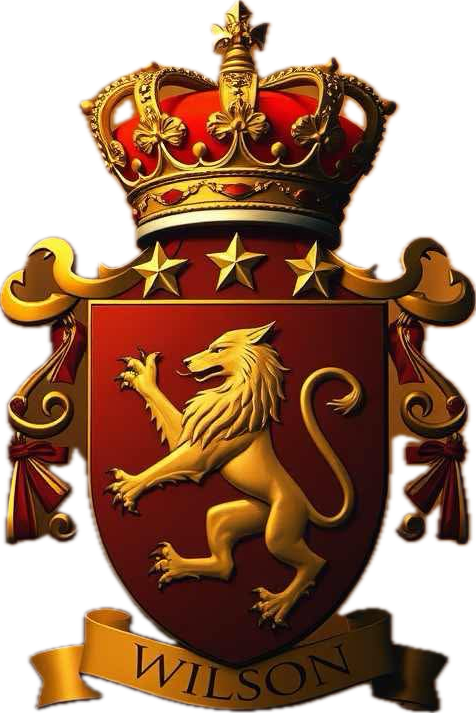
The Wilsons in Scotland and the Wilsons in England are of two different lines which may have a common origin in the distant past. Many of the English Wilsons are of Norman ancestry whereas the Scottish Wilsons are mostly of Picto-Norse descent and represent either a branch (“sept”) of the clan Gunn in Caithness or the much older House of Innes in Banffshire. The clan Gunn Wilsons are descended from George Gunn “the Crowner,” through his son William—hence “Will’s son”—who lived in the late 1400s. However, the Wilsons of clan Gunn were a relatively late-emerging Norse branch of the Wilson surname. The name Wilson dates to a much earlier time in Scotland. The early Nordic Wilsons were descended from a Danish Prince of the Royal House of Norway (Norway administered Denmark for centuries). They established themselves in the Scottish Western Isles (Hebrides) during the Viking era (9th to 11th centuries), soon after 888 when King Harold of Norway routed the more rebellious clans. The name occurs in the Viking Sagas and the Orkneyinga Sagas.
European historians generally refer to the period between the 8th and 11th centuries as the Viking Age. The Vikings expanded east, west, and south of Scandinavia through trading, raiding, and establishing settlements. From bases in Sweden, they invaded the Baltic region and Russia; from Denmark, they invaded England, France, and coastal Spain. The Shetland and Orkney Islands were the first of the British Isles to be colonized around 780, and by 800 the Western Isles, the Faeroe Islands, and Iceland were colonized. In the Orkney Islands, the indigenous Pictish population may have been entirely replaced by Viking settlers from Denmark. Numerous Viking settlements sprang up both east and west of present-day Cheshire County, where our Tattenhall Wilsons were to be centred. Scotland did not regain administrative control of all of these lands until 1469, and the Norn language, the Norse dialect of Shetland and Orkney, survived until the 19th century.
These earliest Wilsons stem specifically from a Danish tribe that followed a 9th-century prince named Wolf—which allegedly gave all Wilsons who possessed a grant of arms the privilege of using the golden wolf on their family crest. The Wilson surname from this line is a corruption of “Wolf’s son” and “Wilf’s son.” Any Wilson coat of arms containing the rampant wolf, and there are a number of them, indicates an ancient line stemming from Prince Wolf in the 9th century. The Wilsons of Sandbach in Cheshire, for example, situated just a few miles from Tattenhall where our Wilsons lived, had just such a coat of arms: a golden wolf on a black background surmounted by three gold stars (or, in the old English/French language of heraldry: “Sable, a wolf rampant Or, in chief three estoiles of the second”). Odds are that our Wilsons, in such proximity but of commoner status by the 18th century, were from the same stock but had lost their armorial roots over the generations. If a definite connection could be made with the Sandbach Wilsons, then any male Wilson descendant of John Wilson of Tattenhall and Lincolnville would be officially entitled to bear arms derived from those shown at the head of this chapter.
Only first sons of first sons of first sons, etc., are allowed to bear the same arms as their ancestor, but all other sons may bear a version of those arms with some slight change introduced. If the bearer of a coat of arms dies without male heirs, his daughters can create their arms by combining their father’s with their husband’s arms. Over a million different surnames exist today, only about 75,000 of which have historically been associated with arms, so we are fortunate that the Wilson name is among them. Of course, it is possible to design your new coat of arms and have it registered, but it would have no legitimate historical connection or significance. It should be noted that the name Wilson was recorded in Ayrshire at least a hundred years before the time of William Gunn: a Michael Wilson, born in the mid-1300s, was a burgess of Ayr in 1418. That example alone predates the Wilsons of the clan Gunn by at least a century or more and probably stems from the more ancient clans. We are of Norse descent for a 9th-century Norse prince, called Wolf and his descendants who settled in the Orkney Isles. For this reason, our Wilson name became a corruption of ‘Wolf’s son’.

Leave a Reply